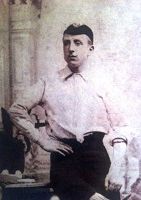James "Jimmy" Orr

James Orr, also known as "Duster" or "Dusty, whilst he was Gorbals-born was soon to be on his way. His father was an "Engine Finisher" from Kilmaurs in Ayrshire by Kilmarnock, his mother from Carluke via Dumfries. And it is to Kilmarnock the the couple plus Jimmy returned, his father employed at the Railway Works.
So young Dusty learned his football not in Glasgow but in the hot-bed of Killy. In fact after junior football with Shawbank he first joined Kilmarnock Athletic in 1889 as in 1888 it had reformed, and then, as it stuttered once more, stepped up for two more seasons, as a proven full-back, to Kilmarnock itself.
And it was at Kilmarnock that he began to be recognised. In 1891 at just nineteen he both played for Ayrshire and Killy won the Ayrshire Cup. He also would show up well in the Scottish Cup. In December 1891 in the Second Round the Rugby Park club was pitted against Rangers. On 19th they drew at Ibrox, no score. Then on 26th it was a 1-1 draw in Kilmarnock. In fact the tie was only resolved on 23rd January, the designated day of the Third Round, at the neutral venue of the then St. Mirren ground in Paisley. There the Gers finally came through, by the odd goal in five, going on eventually to lose to Celtic in the Semi-final and it was shortly afterwards Jimmy received what was to be his only Scotland call-up, at left-back in a 6-1 home-win over Wales, 6-0 until the 87th minute.
It seems those Cup games and the international pricked immediate interest Down South and at the end of the season Orr turned professional, ruling himself out of further caps by joining Darwen for what was to be three seasons. Just relegated to the English Second Division but with him gradually getting a starting-place the team bounced back. However, it was not sustained, a second and final relegation followed with the club this time remaining mid-table and no better.
By now Orr was still only twenty-four and when in 1895 he was signed by Celtic and returned North it might have been expected that his potentially peak-years would have been spent at the fore-front of the game in Scotland. In fact the first of his three seasons at Parkhead was spent largely in the reserves, Peter Meechan filling the slot. And even went Meechan moved on David Storrier arrived so Duster only started in total in seven games until he was moved on, returning to Kilmarnock, indeed to Athletic until it folded once more, with a final season before retirement, 1899-1900, spent with Galston.
In fact the hanging of the boots was also to coincide with marriage. In 1900 James Orr wed Agnes Caldwell in Ayr, her home-town, and the couple settled in Knockentiber by Kilmaurs, he returning to his previous trade as an Iron Turner. And it would there that he and Agnes would have three children, two girls and a boy, and live out their lives. Agnes would die in 1940 in Kilmarnock. She was sixty-three. James would follow her in 1942 in Kilmaurs at the age of seventy.
Birth Locator:
1871 - 269, Mathieson St., The Gorbals, Glasgow
Residence Locations:
1881 - 12, Grange St., Kilmarnock
1891 - 50, Bonnyton Sq., Kilmarnock
1900 - 4, Bonnyton Sq., Kilmarnock
1901 - Easton's Buildings, Knockentiber, Ayrshire
1942 - Eastpark Buildings, Kilmaurs, Ayrshire
Death Locator:
1942 - Eastpark Buildings, Kilmaurs, Ayrshire
Grave Locator:
St. Maur's Glencairn Churchyard, Kilmaurs, Ayrshire
Back to the Glasgow Southside Trail
or the SFHG Home page